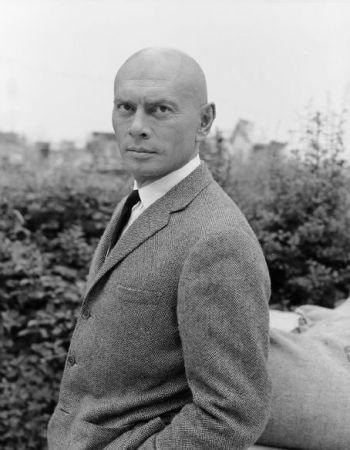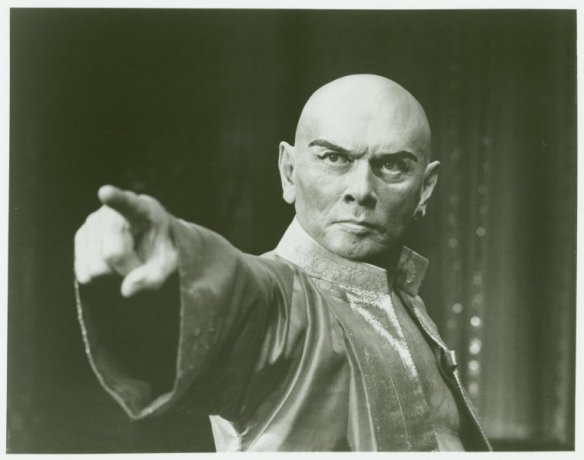 Known for his mysterious, intense looks and bald head, actor Yul Brynner is famous for his film roles in “The Magnificent Seven,” “Anastasia,” “The Ten Commandments” and “The King and I” as the King of Siam.
Known for his mysterious, intense looks and bald head, actor Yul Brynner is famous for his film roles in “The Magnificent Seven,” “Anastasia,” “The Ten Commandments” and “The King and I” as the King of Siam.
But Brynner also played a role in cancer awareness. This week is Oral, Head and Neck Cancer Awareness Week (April 12-18, 2015); an event that Brynner’s own illness helped play a role in.
Brynner and oncologist George Sisson, MD, formed the Yul Brynner Head and Neck Cancer Foundation in 1984 in Chicago. Renamed in 2001 as the Head and Neck Cancer Alliance and based in Charleston, SC, the organization’s mission continues to be educating people on the side effects of tobacco and its connection to cancers of the head, neck and mouth.
While the King of Siam is one of the roles Brynner is best known for, it was also one of his favorites. Aside from the 1956 film version, Brynner performed the role on stage 4,625 times up until three months before his death in 1985, according to his Los Angeles Times obituary.
 Brynner began reprising the role of the King in 1977. He first appeared on stage in the role in 1951. His daughter Victoria called his returning to Broadway for “The King and I” a “God send,” in the documentary “The Hollywood Collection: Yul Brynner- The Man Who Was King,” because he hadn’t been in a good place in his career.
Brynner began reprising the role of the King in 1977. He first appeared on stage in the role in 1951. His daughter Victoria called his returning to Broadway for “The King and I” a “God send,” in the documentary “The Hollywood Collection: Yul Brynner- The Man Who Was King,” because he hadn’t been in a good place in his career.
“He was getting to play again a role that had been his for years,” Victoria said.
In 1983, while Brynner was still playing the King, he learned he had lung cancer. One source, the Encyclopedia of Cancer and Society by Graham Colditz, said Brynner saw a doctor because his throat felt hoarse and that is how he was connected with Sisson. The 2006 biography “Yul Brynner” by Michelangelo Capua said Brynner found a lump on his neck while putting on his makeup. Brynner was diagnosed with inoperable lung cancer in September 1983 by three oncologists.
Brynner tried to keep his illness quiet from the public; only telling close friends and family members, according to Capua’s book. Brynner started smoking as a kid and smoked five packs of cigarettes a day, according to his Los Angeles Times obituary.
“I recall very clearly the night that he called me. He said, ‘I don’t have very good news and that he had three months to live,’” Victoria said. “From then on it was a battle to defy this disease. He kept on doing the King and I. It gave him structure: something to do every day, something to fight for. It gave him two and a half years that we really hadn’t hoped for.”
Brynner underwent radiation treatment, because the side effects were less severe than chemotherapy, according to Capua’s biography.
“Having been ill has opened my eyes suddenly to the fact that, the gypsies have a wonderful phrase for it: ‘Your future is getting shorter.’ There are things I want to do beyond sharpening and honing this role further,” Brynner said in a 1984 New York Times interview. “At the same time, the illness has changed the King for me. Some lines come as a surprise suddenly: ‘Every day, my Lord in heaven show the way’ and ‘Every day I try to live for one more day.’ This describes completely how I do the show and how I survived the illness.”
While still performing, the play was renamed “The King and I: Farewell Tour,” and Brynner would visit cancer patients in hospitals. He spoke with a 10-year-old boy who was bald due to his radiation therapy, and told the child, “See, I’m a star and I’m bald. It’s not so bad being bald,” according to Capua’s biography.
Brynner’s last performance in the “King and I” was June 30, 1985.
Before his death, Brynner was interviewed on Good Morning America (GMA) where he told the reporter that he wanted to film a commercial before his death warning people about the dangers of smoking. Part of this interview was edited into a PSA for the American Cancer Foundation.
“If I could take back that smoking, we wouldn’t be talking about any cancer,” Brynner said on GMA. “I smoked a lot since I was a kid just to appear macho, because I didn’t have brains enough. Something else makes you macho. I really wanted to make a commercial when I realized I was so sick.”
The commercial aired posthumously.
“Now that I’m gone, I tell you: Don’t smoke, whatever you do, just don’t smoke,” Brynner said.
He died on Oct. 10, 1985, at age 65 at New York Hospital- Cornell Medical Center.
“There was an idea that you go to bed not knowing if you have a tomorrow and you must be thankful for every tomorrow and make the most of it,” Brynner told the New York Times in 1984. “I couldn’t see myself going to bed and waiting to see what would happen with my illness. I preferred to play to 2,000 or 3,000 people and standing ovations. The choice is quite simple.”
Check out the Comet Over Hollywood Facebook page, follow on Twitter at @HollywoodComet or e-mail at cometoverhollywood@gmail.com


Yul was a lot of things during his life and career but in death he was heroic.
LikeLike
Excellent article and very informative! I loved Yul’s role in Westworld. I didn’t realize he performed in The King & I so many times!
LikeLiked by 1 person
I vividly recall these commercials. Chilling. My mom had a crush on Brenner and yet she too died of cancer- in 1981, at the age of 34. So whenever I saw those commercials, I couldn’t help but think of her too.
LikeLiked by 1 person
Yes, I remember this well. Wonderful post. Thanks for sharing this.
LikeLike
I remember seeing that PSA as a kid and how sad it made me. Great post.
LikeLike
“There was an idea that you go to bed not knowing if you have a tomorrow and you must be thankful for every tomorrow and make the most of it,” He just made a choice on how to live the rest of his life…by inspiring more people through his craft in spite of his illness, and remind us how dangerous smoking really is. I was touched when he talked to the kid. Heroic indeed.
LikeLike
Pingback: “My hope that women will not be afraid”: Classic Actresses who had Breast Cancer | Comet Over Hollywood